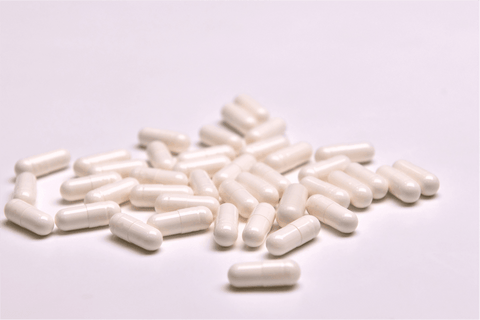Berberine vs Ozempic: What You Need to Know About Their Mechanisms of Action

Key Takeaways
-
Berberine and Ozempic: Different Mechanisms for Metabolic Health
Berberine activates AMPK to boost metabolism, while Ozempic mimics GLP-1 to reduce appetite and regulate insulin. -
Natural vs Prescription: Berberine as a Holistic Alternative
While Ozempic is a prescription drug proven for diabetes, berberine offers a natural, affordable supplement for blood sugar control. -
Combining Berberine and Ozempic Requires Caution
Both lower blood sugar, so always consult a healthcare provider before combining to avoid hypoglycemia risks.
What is Berberine?
Berberine is a natural compound found in plants like goldenseal and Oregon grape. Traditionally used in Chinese medicine, its health benefits are now backed by modern research. Unlike prescription weight loss drugs, berberine is available as an over-the-counter supplement.
How Berberine Works in the Body
Berberine activates AMPK (adenosine monophosphate-activated protein kinase), often called the "metabolic master switch." AMPK regulates energy balance and helps:
- Increase insulin sensitivity
- Lower blood glucose levels
- Improve metabolism
Can Berberine Be Used for Weight Loss?
Studies suggest that berberine promotes weight loss by enhancing fat breakdown and reducing fat storage. By improving insulin sensitivity and promoting metabolic health, it has become a popular natural option for weight loss.
Is Berberine Safe?

Berberine is generally safe for most people when taken at the recommended dosages. However, it can interact with medications and cause side effects if taken improperly.
Potential Drug Interactions
Berberine can enhance the effects of blood sugar-lowering medications, so you should consult with a healthcare provider if you're on any prescription drugs.
Can You Take Too Much Berberine?
Excessive doses of berberine may cause gastrointestinal issues such as diarrhea, cramps, and bloating. Stick to recommended doses, typically around 500 mg, taken 2-3 times daily.
What is Ozempic?
Ozempic (semaglutide) is a GLP-1 receptor agonist used to treat Type 2 diabetes. It helps lower blood sugar and also has the benefit of promoting weight loss, which has led to its off-label use for this purpose.
How Ozempic Works in the Body
Ozempic works by mimicking the GLP-1 hormone, which helps regulate blood sugar and insulin production. It also:
- Reduces appetite
- Delays the process of stomach emptying, helping you stay fuller for an extended period.
- Helps manage blood glucose levels after meals
Ozempic for Weight Loss: Is It Safe?
Ozempic has been proven effective for weight loss in clinical trials, but it’s important to note that it’s a prescription medication with potential side effects, including nausea, diarrhea, and possible long-term complications.
Can I Take Berberine and Ozempic Together?
Yes, but consult your doctor first. Both lower blood sugar, and combining them may increase the risk of hypoglycemia. Always monitor your blood sugar closely.
Safety and Potential Interactions
Taking berberine and Ozempic together can have additive effects on blood sugar levels, which may lead to hypoglycemia (low blood sugar). It’s crucial to consult with your healthcare provider before combining these two, as they both impact blood sugar control.
What You Should Know Before Combining Them
If you are considering combining berberine with Ozempic, it’s important to monitor your blood sugar levels closely. A healthcare provider can guide you on the correct dosages to avoid adverse effects.
A Comprehensive Comparison of Berberine and Ozempic

Berberine is a natural supplement, whereas Ozempic is a medication available by prescription. Both help lower blood sugar, but Ozempic is clinically proven and faster acting. Berberine is a natural, affordable alternative.
|
Trial |
Status |
Phase |
|
Berberine as a natural option |
Ongoing research |
Natural Supplement |
|
Ozempic for blood sugar control |
Proven effective |
Prescription Drug |
|
Berberine for weight loss |
Promising |
Supplement |
|
Ozempic for weight loss |
Clinically proven |
Prescription Drug |
Mechanisms of Action: How Berberine and Ozempic Differ
- Berberine works by activating AMPK, improving glucose uptake and enhancing metabolic function.
- Ozempic mimics the GLP-1 hormone, stimulating insulin production and controlling appetite.
How Berberine and Ozempic Support Weight Loss
Both these options have been researched for their potential in weight loss. Ozempic has more extensive clinical backing, particularly for those with Type 2 diabetes, while berberine shows promise as a natural alternative for general metabolic health.
Which is Better for Managing Blood Sugar?
Ozempic may be more suitable for individuals managing Type 2 diabetes due to its strong glucose-lowering capabilities. On the other hand, berberine serves as a natural supplement for maintaining balanced blood sugar.
Is Berberine a Replacement for Ozempic?
No, Berberine is not a direct replacement. While both reduce blood sugar, Ozempic is a prescription medication with extensive clinical backing.
Can Berberine Serve as a Natural Alternative?
If you’re looking for a more natural option, berberine may serve as an alternative to Ozempic. However, it may not offer the same level of potency as a prescription medication, particularly for individuals with severe blood sugar imbalances.
Advantages of Berberine Over Ozempic
- Natural Origin: Berberine is plant-based, whereas Ozempic is a synthetic medication.
- Fewer Side Effects: Berberine has a more favorable safety profile for most people.
- Cost: Berberine is generally less expensive than prescription medications like Ozempic.
How to Use Berberine and Ozempic Safely
Consult your doctor before combining. Regularly check your blood sugar levels to prevent low blood sugar. Take Berberine with meals and follow your Ozempic dosage as prescribed.
Berberine Dosage Guidelines
Most studies suggest taking 500 mg of berberine 2-3 times a day, usually before meals, to help with blood sugar control and weight management.
What is the Ideal Ozempic Dosage?
Ozempic is typically started at a low dose of 0.25 mg per week, which can be increased depending on how well you tolerate the medication and its effects on your blood sugar levels.
Other Supplements to Stack with Berberine
Consider Alpha Lipoic Acid, Milk Thistle, or Chromium. Always check with a healthcare provider before adding supplements, especially when using medications like Ozempic.
What Are Good Supplements to Combine with Berberine for Maximum Benefit?
If you’re looking to enhance the effects of berberine, consider stacking it with:
- Alpha-lipoic acid (ALA): For improved insulin sensitivity.
- Cinnamon: Known for its blood sugar-lowering properties.
- Milk thistle: For liver support and improved detoxification.
FAQs
Is berberine as good as Ozempic?
No, Ozempic is more effective for weight loss and diabetes, while berberine is a natural alternative for blood sugar control.
Why don't doctors recommend berberine?
Doctors don't recommend berberine due to lack of FDA approval and potential drug interactions.
What is the best natural alternative to Ozempic?
Berberine is considered the best natural alternative to Ozempic for blood sugar and weight management.
How quickly do you lose weight with berberine?
Weight loss with berberine can start within 4-8 weeks, depending on diet and exercise.
Why am I not losing weight on berberine?
Weight loss with berberine may take time. Check your dosage, diet, and exercise. For best results, combine berberine with a healthy lifestyle. Consult your doctor for guidance.
Conclusion
In conclusion, both berberine and Ozempic offer unique mechanisms of action to support blood sugar control and overall health. While Ozempic is a prescription medication, berberine serves as a natural alternative for those seeking more holistic options. If you're looking for high-quality supplements to support your health journey, explore our range of products at Just Glow. Find out which of these two may be the right fit for you and begin your journey toward better health today!Summary
Are you curious about Berberine vs Ozempic for metabolic health? These two options are popular for weight management and blood sugar control, but how do they really work? In this post, we’ll break down the key differences in their mechanisms of action, helping you make an informed choice for your health.






